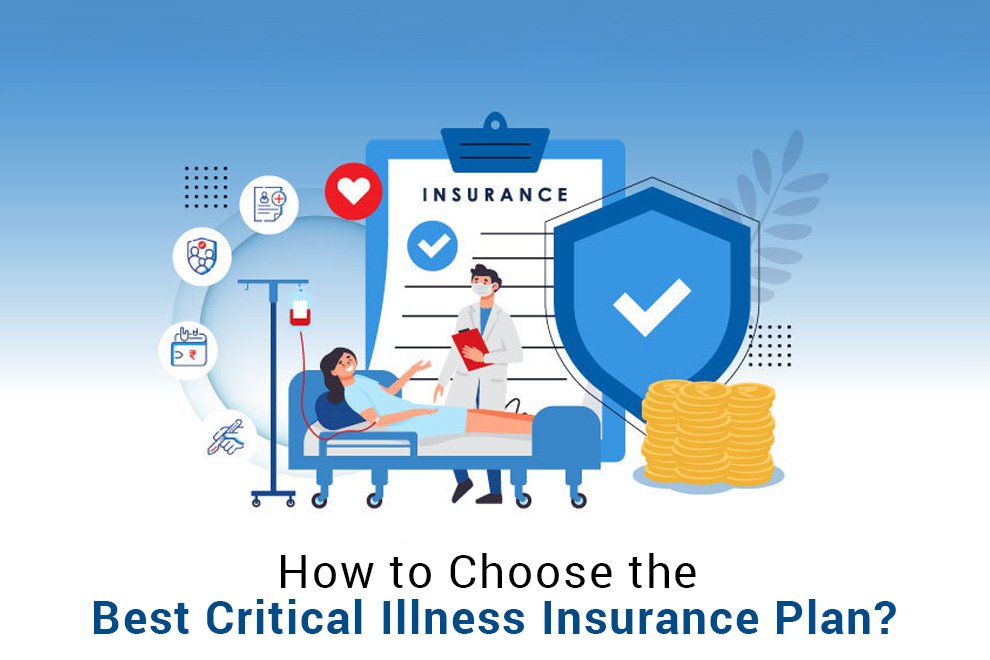With the alarming rise in critical illnesses, it’s crucial to consider an additional layer of protection—critical illness insurance. This specialised coverage acts as a financial lifeline when faced with severe health challenges, covering expenses that standard health insurance plans often overlook. To help you manage this crucial decision, here’s a guide on how to choose the best critical illness insurance plan.
Understanding Critical Illness Insurance
Critical illness insurance is designed to cover serious health conditions like heart attacks, cancer, and strokes. Unlike standard health insurance plans that cover hospitalisation costs, critical illness insurance pays a lump sum upon diagnosis of a covered illness. This amount can be used for treatment, post-surgery care, lifestyle changes, or even for income replacement during recovery.
Why Do You Need Critical Illness Insurance?
As medical technology advances, many life-threatening illnesses are now treatable. However, the cost of these treatments can be extremely high. Critical illness insurance helps by providing financial support during such challenging times, ensuring that you and your family are not burdened by medical expenses.
Tips for Choosing the Best Critical Illness Insurance Plan
Selecting the best critical illness insurance plan is crucial for ensuring financial protection during medical emergencies. Here are essential tips to consider:
1. Know the Cost of Medical Procedures
Before deciding on a critical illness cover, understand the costs associated with treating severe illnesses. Medical expenses for treatments like angioplasty or bypass surgery can be overwhelming. Knowing these costs will help you choose a higher cover to account for inflation and the rising cost of healthcare.
2. Understand What the Plan Covers
Not all critical health insurance plans are the same. Some might cover a wide range of illnesses, while others might have a more limited scope. Review the list of covered illnesses and procedures carefully. Ensure that the plan you choose covers a comprehensive range of diseases that you might be at risk for.
3. Check the Sum Assured Options
The sum assured is the amount you will receive if diagnosed with a covered illness. Opt for a plan that offers a sum assured sufficient to cover the potential expenses. Plans from reputable companies provide a wide range of sum-assured options, ensuring you can find a cover that suits your needs.
4. Look at the Claim Settlement Ratio
A high claim settlement ratio is a good indicator of the reliability of an insurance company. It shows the percentage of claims that the company has settled successfully. Before choosing a plan, check the claim settlement ratio of the company. A company with a high ratio, like Bajaj Allianz General Insurance Company, with a claim settlement ratio of around 90%, ensures that your claims will be processed smoothly and efficiently.
5. Consider the Waiting Period
Critical illness insurance policies usually have a waiting period, which is the time before the coverage kicks in. This waiting period can vary from one insurer to another. Make sure you understand the waiting period for the initial coverage, survival period, and the waiting period between claims if you have multiple policies.
6. Evaluate the Premium Costs
The premium is the amount you pay for the insurance coverage. Consider your budget when selecting a critical illness plan. Compare premiums across different plans, but remember that the cheapest plan might not always be the best. Balance the premium cost with the coverage benefits to find a plan that offers good value for money.
7. Check for Additional Features and Benefits
Some critical illness insurance plans come with additional features, such as the return of premium on maturity, waiver of premium on disability, and coverage for multiple family members. Evaluate these features to see if they align with your needs. Plans that offer more flexibility and additional benefits can provide better overall protection.
Who Can Be Covered Under the Policy?
Critical health insurance policies often cover not just the policyholder but also their family members. This can include spouses, dependent children, parents, and even extended family members like in-laws and siblings. Check the policy details to see who can be included and ensure that your loved ones are protected as well.
Age and Lifestyle Considerations
Age is a significant factor when choosing a critical illness insurance plan. Older individuals are more prone to critical illnesses and may require higher coverage. Additionally, your lifestyle can impact your health risk. If you have a family history of certain diseases, you might need a more comprehensive plan. Ensure the plan you choose considers these factors and provides adequate coverage.
Renewal and Portability Options
A good critical illness insurance plan should offer lifetime renewability, ensuring continuous coverage. Also, check if the plan allows portability, meaning you can switch to another insurer without losing the benefits of your current policy. This flexibility can be crucial if you find a better plan in the future.
Understanding Exclusions
Every insurance policy has exclusions, which are conditions or situations not covered by the plan. Common exclusions in critical illness insurance include pre-existing conditions, certain lifestyle diseases, and illnesses diagnosed within the first few months of the policy. Read the policy document carefully to understand what is not covered.
Choosing the best critical illness insurance plan involves thorough research and consideration of several factors. From understanding the costs of medical procedures and checking the sum assured options to evaluating the claim settlement ratio and considering your lifestyle, each aspect plays a crucial role in finding the right plan. By taking these tips into account, you can ensure that you and your loved ones are financially protected against the high costs of treating critical illnesses.
Standard T&C Apply
**Disclaimer: The content on this page is generic and shared only for informational and explanatory purposes. It is based on several secondary sources on the internet and is subject to changes. Please consult an expert before making any related decisions.
***Insurance is the subject matter of solicitation. For more details on benefits, exclusions, limitations, terms, and conditions, please read the sales brochure/policy wording carefully before concluding a sale.
****Claims are subject to terms and conditions set forth under the health insurance policy.










